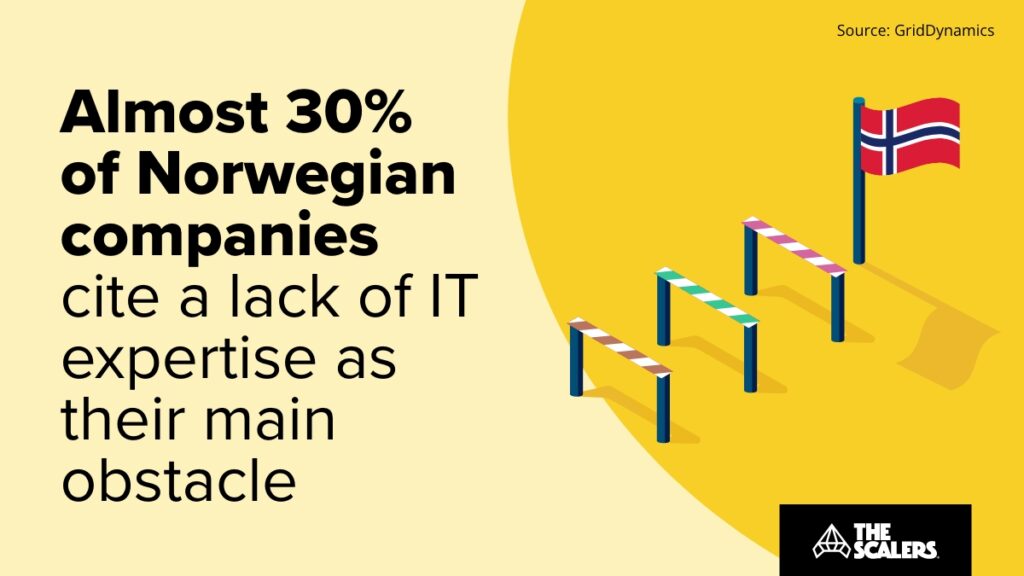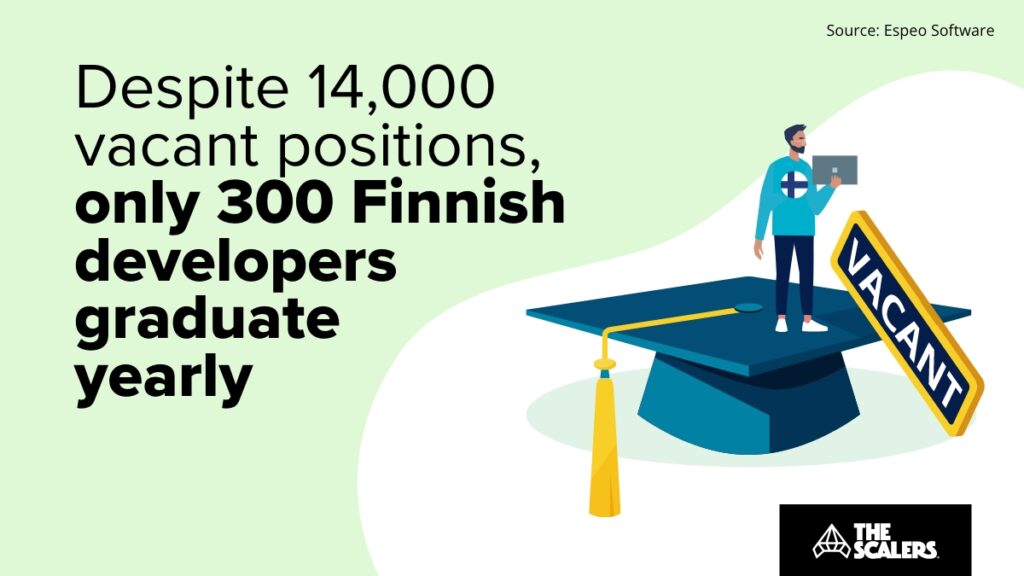Even though tech investment in Scandinavia remains high, a looming shortage of software engineers is threatening to undo its progress. On average, Nordic countries produce only 5,000 engineers annually, which is significantly lower than other parts of the world. This means Scandinavia’s talent gap is quite severe. Each country shows remarkable similarities, especially considering their respective sizes. Unfortunately, the situation is projected to worsen in the coming years. For instance, Denmark may experience a shortfall of 13,500 engineers by 2025, while Norway is expected to have a deficit of 10,000 engineers by 2030. Even more alarming, Sweden will likely lack 70,000 developers by 2024.
Even though the Swedish public employment service Arbetsförmedlingen has stated that there needs to be a closer alignment between the government’s proposals and the skills required by employers, this alignment may not be achievable until 2030. And although some Scandinavian governments have pledged to increase the number of engineering students, it’s not easy to artificially inflate the size of the talent pool, even through increased immigration.

The importance of choosing the right operational model
According to Computerworld magazine, companies should seriously consider recent hiring graduates who can adapt well to their company culture. The authors emphasise the importance of smooth onboarding and taking responsibility if a project fails during the first two years. While hiring recent graduates is a must, there still aren’t enough graduates in software development to provide the specialised talent that Scandinavia needs to continue growing. This means that Scandinavian organisations will need to look beyond their borders to meet their increasing needs.
With Scandinavia’s talent gap ever-increasing, CTOs all over the region are expressing their frustration with the lack of available developers. Many large Scandinavian organisations, like Spotify, have begun teaching coding to schoolchildren as an extracurricular activity. However, the fact that the students are still children means that companies won’t tackle the issue anytime soon. That’s why in Sweden, some companies have begun outsourcing and offshoring to other emerging tech economies.
However, outsourcing to a third-party can bring with it a whole host of issues, such as the lack of a dedicated development team and the right amount of cultural and team integration. That’s why offshoring can be a better model for maintaining control over your development team. It also allows companies to tap into a larger pool of talent, especially for specialised skills. Offshoring to countries like India, which have a strong skill infrastructure and a technological vision that aligns with the company’s needs, can help ensure success. Finding a culturally compatible offshore partner who is easy to communicate with and committed to the project’s success is key to overcoming Scandinavia’s talent gap.

The effect of emerging technologies on Scandinavia’s talent gap
We all know that technologies like AI, ML, the Cloud and the Internet of Things (IoT) are transforming the IT market across the globe. A Gartner report published in April 2022, estimated that global end-user spending on public cloud services in 2023 will reach $600 billion. The rise of the loT has also led some analysts to predict an even greater need for software developers. Markets and Markets, claims that the loT market could exceed 650 billion by 2026 and the AI market could see a rise to 407 million by 2027. With this said, how exactly do emerging technologies and the rise of these tools affect Scandinavia’s talent gap? Simply, it puts pressure on Scandinavian countries to keep up with the increasing demand for engineers.
If you’re looking for your next developer, it’s important to consider that engineers tend to be concentrated in certain geographical locations. This means that it may be necessary to look outside of Europe to find the right talent. For instance, India has become a popular destination for cloud computing and loT. And the city of Bangalore, India is at the top of the list for recruiting cloud computing professionals. This is likely due to high demand from major multinational companies such as IBM and Amazon, resulting in a surge in the number of cloud computing courses offered in Bangalore to meet this demand.
What’s more, the online learning platform Coursera has two million users in India, indicating that Indians have a strong interest in online learning. Their enthusiasm for online courses is second only to the United States, with technology and English courses attracting the highest enrollment numbers. These courses, taught by professors from top universities such as Stanford and Ivy League schools, are helping to equip young Indians with globally sought-after skills that are in short supply.

What you need to know
Why are these facts so important in the decision-making process? When it comes to addressing Scandinavia’s talent gap, the goal should not be to simply hire the largest pool of candidates available. Instead, it’s important to consider destinations with strong software development skills and choose a partner whose vision aligns with your company’s needs.
Finding a reliable offshore partner is particularly important in the current situation, as the shortage of developers in Scandinavian countries has created highly competitive markets. This means that companies may need to consider expanding their search to find a partner who can provide the necessary skills and resources. By partnering with an offshore team that has the right expertise and experience, Scandinavian companies can overcome the shortage of developers and successfully execute their IT projects with ease, while also gaining a competitive advantage in their respective industries.
Key takeaways:
-
1
Scandinavian countries currently struggle with immense talent gaps in key tech roles
-
2
The gap is widening due to low levels of skilled IT graduates and high retirement numbers
-
3
Scandinavian firms are increasingly turning to outsourcing and offshoring to plug their talent gaps
-
4
The right offshore partner can help companies find both the right skills and cultural fit for maximum productivity
What’s more, a reliable offshore partner who is culturally compatible can also ensure that you effectively communicate your goals, strategies, and concerns without being misunderstood. When seeking an offshore partner, it’s essential to find a team that is easy to reach and communicate with. If you want to find a partner who is just as committed to your product’s success as you are, and who you can rely on to provide daily updates and progress reports then contact The Scalers today.
Build Your Team,
Not Just a Contract
With The Scalers’ offshore dedicated development team, you get engineers who join your workflow for the long run. Grow steadily, stay flexible, and work with people who care about the product as much as you do.










